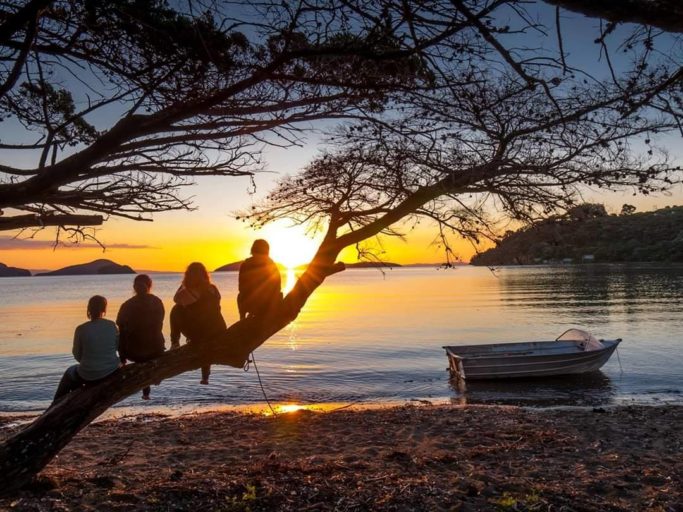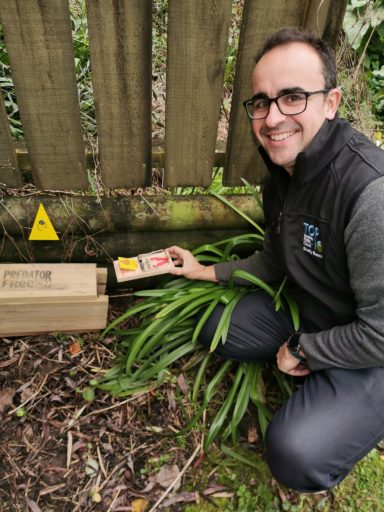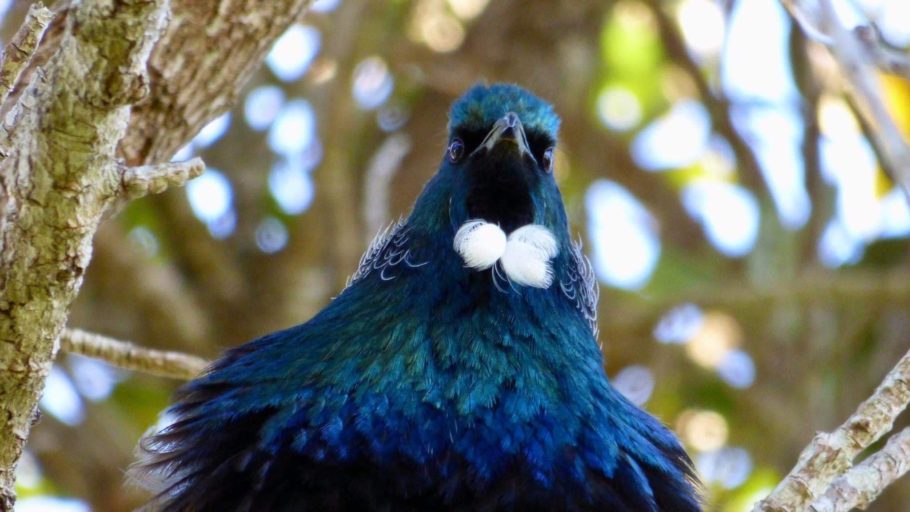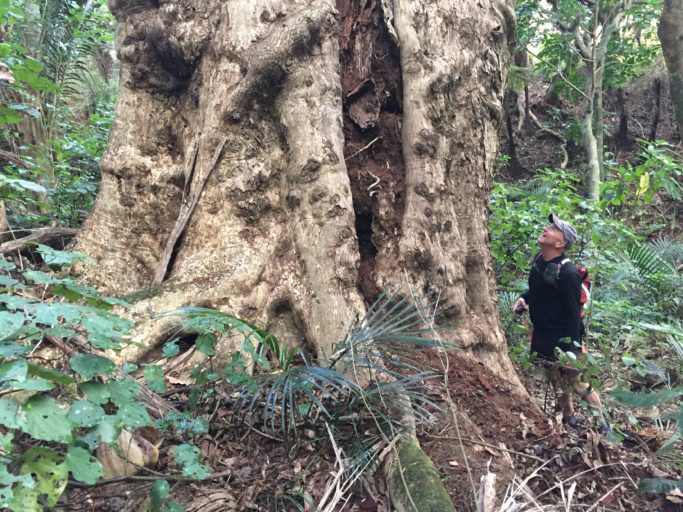On the Coromandel Peninsula, individuals and organisations are coming together to tackle predators and protect the local wildlife and stunning surroundings. This is just one of their stories.

Aaron McFarlane and his family are first-time holiday park owners.
“My parents bought Shelly Beach TOP 10 Holiday Park about 3 years ago,” Aaron explains, “The beachside holiday park is about 5 minutes north of Coromandel town with 7 acres of park and 7 acres of forestry right by the picturesque beach. Farmland and native bush surround the park, so the native birds come in – but so did the rats, stoats and possums!”.
After returning from a Holiday Park Association conference in 2018 inspired about predator control Aaron and his family were keen to get a programme started at Shelly Beach TOP 10 Holiday Park. But Aaron wasn’t just new to the Holiday Park industry – trapping predators was a whole new ballgame for him too.
Raine Williams is a Coromandel local. She’d previously worked for about 8 years as a contract trapper for the Department of Conservation, before stepping away from that job to work at the Mahakirau Forest Estate. Predator Free New Zealand Trust put Aaron in touch with Raine.
“I sat down with Aaron and looked at what sort of areas there are,” explains Raine. “The caravan park is a really interesting setup with the paddock and pine bush block. We looked at what types of traps we needed and where they should go. In the park itself – because of the children – we decided to just have Victor rat traps in boxes. In the bush block where there are lots of kaka, we’ve got A12 and A24 (Goodnature self-resetting traps for possums and rats) and DOC 200 traps.”

Raine also helped Aaron set up some baseline monitoring.
“Not far away from the holiday park there’s an old puriri tree and kōwhai trees growing on a Thames Coromandel District Council property on the foreshore and there were possum tracks travelling through the pine block to the puriri,” says Raine.
The ancient puriri was just one of many beautiful trees at risk from possum damage.
“Aaron was really excited about starting predator control and it’s gone really well,” Raine adds.
“We’ve mostly caught rats and the odd mouse and a couple of stoats,” Aaron reports. “The A12s have caught some possums and Raine has been moving the equipment around to get them. Darren, our onsite manager, has done a great job in regular checking of equipment around the property.”
“Initially there was a knockdown within the camp where we have the rat traps,” Raine says. “The traps have kept the rat population down. Then with Covid 19 in March, the holiday park was short on staff. They couldn’t check the bushblock because of lockdown, so for the last 3 months (since lockdown ended), I’ve been checking the bushblock to help them get through a tough spot.”
“There’s one possum that’s been impossible to catch, though” Aaron adds. “It’s been there forever. Raine has tried everything – different kinds of traps etc.”
Aaron involved some of his extended family in setting up the trapping programme too.
“It was school holidays when we started so we put my cousin’s kids to work. This was all new to them too, so we all learnt a lot from Raine. For a bit of fun, we put the tracking tunnel cards up on our Facebook page for people to guess what was coming through the tunnels. There were a lot of wētā but also clearly rats.”
“The children helped set up the tags and identifiers and we got them involved in checking the rat traps too,” says Raine.
As tourism providers Shelly Beach TOP 10 Holiday Park signed up to the Tiaki Promise which is a commitment to care for New Zealand, for now and for future generations.
“The tūī life has really taken off since we’ve been doing it,” says Aaron. “We try to get guests aware of our surroundings. The international guests we did have prior to Covid border closures loved seeing our native bird life… we would warn guests that they’ll be woken by the soundtrack of tūī!. We also incorporated the native birds into the names of our Beachside Glamping Pods which guests enjoy”.
Aaron has had funding support from Environment Waikato’s Small-Scale Initiative Fund to set up his initial trapping programme.

“Raine said we should apply and helped with the application,” he says. “They granted us around $2800 to buy equipment. We really think more businesses and organisations should know that funding is available to help with projects like ours.”
The regional council is also supporting Aaron’s latest trapping initiative at his newly purchased Anglers Lodge at Amodeo Bay.
“In February we bought Anglers Lodge which is about 12 kilometres up the road from Shelly Beach” says Aaron. “When we took over it was clear there was a rodent problem there too, then Covid hit us hard and we had to shut up shop 7 weeks after taking over during Level 4 lockdown. I noticed the funding round was up again, so I applied and was fortunate with funding here too. We are excited to see some results come through up there with kiwi present in the native bush behind the lodge. Getting rid of rodents increases the bird life.”
The latest trapping equipment has just arrived and Aaron is keen to get on top of that problem smartly too.
“Aaron is the driver of the trapping programme,” says Raine. “He’s enthusiastic, young, energetic, making it happen and that’s so key! There are so many programmes around the Coromandel where one or two people make it happen and pull others along with them.”
Raine herself is surely one of those people. After volunteering for Moehau Environment Group for 6 years, she has recently stepped back a little from that work, in order to get more involved in lots of other little projects.
“Where I live in the Whakanekeneke Catchment there are 16-17 owners who are responsible for over 100 hectares. My partner Jeff and I thought we should do something about the possums and we successfully received funding from Waikato Regional Council through the Small Scale Community Initiatives Fund). In the next funding round, we want to tackle rats and almost all the landowners are really keen to allow access to their land for trapping.”
Then there’s the Mahakirau Forest Estate where Raine works.

“It’s about 600 hectares. Archey’s frog and Hochstetter’s frog are found there, forest ringlet butterflies, the Coromandel striped gecko – it’s got all the most precious Coromandel species,” Raine says. “It’s got great predator control – like an island. Then just north of Coromandel there’s Colville Harbour Care who are starting to do lots. They had 3 years of funding from the Ministry for the Environment (Community Environment Fund) for predator control programme and riparian planting. So many cool things are happening – you can just watch it spread.”
Seeing the results is what makes all the work worthwhile.
“The old fellas – the old iconic trees like puriri, rata and kohekohe come back to life,” she says. “At one large 200 hectare project – the Ki Uta Ki Tai Project at Papa Aroha– there were old massive kōwhai that were really suffering from the possums. Two years later the kōwhai have come back to life – and now they’re being stripped by kereru!”
Raine says it’s exciting to see so many landowners and small collectives getting involved on the Coromandel and to see groups working together more.
“From Coromandel town to Port Jackson there’s now a safe corridor for wildlife,” she says. “We’re hearing kiwi further and further south. It’s making a huge difference!”

